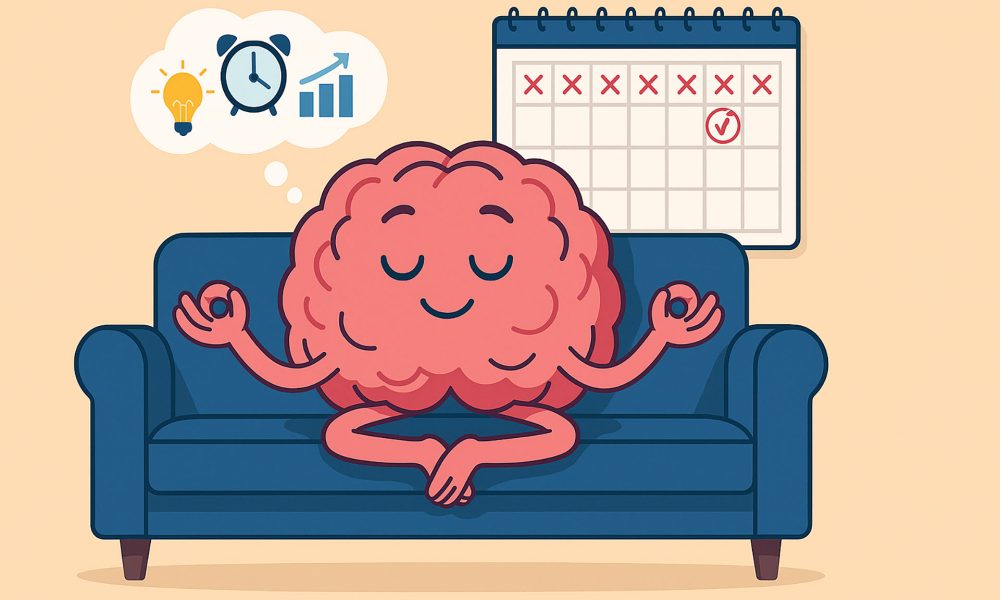Have you ever sat down to meditate, eyes squeezed shut, wondering if you’re doing it right—or if it even works at all? You’re definitely not alone. Many people try meditation once or twice and stop before noticing any benefits. But here’s the surprising part: science shows measurable meditation and brain changes can happen after just one week of consistent mindfulness practice.
Table Of Content
Real-life changes often show up subtly—like feeling less irritated during your commute or noticing you’re more patient during tense meetings. These quick, practical transformations are exactly why Siddha’s meditation challenges exist—to help you see real, meaningful change quickly and effectively.
From improved sleep to emotional stability and sharper thinking, the short-term effects of meditation can begin reshaping how your brain works in just seven days. Let’s explore exactly what happens inside your brain after seven days of meditation.
What Happens to Your Brain When You Meditate?
Meditation isn’t magic, but it might feel that way once you see what’s happening beneath the surface. When you meditate, brain activity shifts from the default mode network—the constant mental chatter—to regions responsible for focus, emotional regulation, and self-awareness. That’s the core of how meditation improves brain function.
Regular meditation even reshapes your brain physically. Consistent practice is linked to growth in the brain changes after meditation and shrinkage of the amygdala (your brain’s stress alarm system). Harvard researchers famously observed these structural changes within just eight weeks—but early indicators appear even sooner. These meditation and brain function shifts are what make it easier to stay present, respond thoughtfully, and reduce the mental noise that drains your energy.

What Are the Immediate Brain Changes After 7 Days of Meditation?
Surprisingly, the short-term effects of meditation appear faster than most people expect. After just 7 days, your brain begins to:
- Reduced amygdala activity, helping lower stress responses.
- Increased alpha wave activity, promoting calm alertness.
- Improved sleep patterns, crucial for overall mental wellness.
These early meditation and brain function shifts are subtle but powerful.. Siddha’s meditation challenges are specifically designed to highlight these early victories, reinforcing your new habit. These early improvements reflect measurable brain changes after meditation, often visible through brain imaging and EEG scans in as little as one week.
How Meditation Enhances Brain Connectivity in Just One Week
Even within a single week, your brain begins adapting to a new rhythm. One of the key short-term effects of meditation is improved communication between regions responsible for attention, emotion, and self-awareness. Studies show that consistent practice can strengthen connections between the amygdala and prefrontal cortex—two areas deeply involved in emotional control and stress regulation.
These early shifts are part of the broader meditation and brain changes researchers continue to observe. They help you stay grounded, think more clearly, and respond with intention rather than reactivity—even in the middle of a busy week.
How Does Daily Meditation Improve Focus and Attention in Just One Week?
Even short daily meditation practices dramatically boost focus and attention. Research confirms that 7-day meditation benefits cognitive flexibility and attention span.
Siddha’s meditations are flexible, ranging up to 15 minutes, but always adaptable so you can choose lengths that best fit your schedule and comfort level. Picture yourself calmly finishing an email without impulsively checking Slack or texts mid-sentence. With regular meditation, that’s not just wishful thinking—it’s achievable.
Can Meditation Reduce Stress and Anxiety Within a Week?
Yes—meditation reduces stress and anxiety within just a few sessions.. Studies show meditation reduces cortisol, your body’s primary stress hormone, after just three or four sessions. In fact, research found a 14% drop in perceived stress after only five days of guided meditation.
Think of meditation as your mental shock absorber, giving you valuable breathing space between stressors and your reactions. Siddha’s Mental Fitness and Mindfulness Challenges center around helping you cultivate this buffer effectively.

What Happens to Your Brain Waves After 7 Days of Mindfulness Practice?
One of the most fascinating short-term effects of meditation is how it alters your brain wave activity:
- More alpha and theta waves associated with relaxation.
- Fewer beta waves linked to anxiety and busy, racing thoughts..
Simply put, meditation helps your brain operate at a calmer, steadier frequency. EEG studies repeatedly confirm these effects, often leaving meditators feeling noticeably calmer in situations that used to feel overwhelming. These changes in brain waves after 7 days of mindfulness practice make it easier to handle daily stressors with clarity and calm.
Understanding Brain Wave Changes After Seven Days of Meditation
After just seven days of consistent meditation, your brain’s electrical activity begins to shift in measurable ways. Studies utilizing electroencephalography (EEG) have shown increases in alpha and theta wave activity during meditation sessions, which are associated with states of relaxation and focused attention. iMotions
These changes in brain wave patterns are part of the broader brain changes after meditation observed in short-term practitioners. By promoting a calmer and more focused mental state, these shifts can contribute to improved emotional regulation and cognitive function.
How Does a Week of Meditation Affect Emotional Regulation?
Within a week, meditation significantly improves emotional regulation, helping you:
- Create space from emotional triggers.
- Develop stronger impulse control.
- Cultivate deeper compassion towards yourself and others..
This is one of the most powerful 7 day meditation benefits, and Siddha’s Relationship and Mental Fitness Challenges can directly support you in harnessing these emotional benefits.
Boosting Mood and Emotional Well-Being Through Short-Term Meditation
Even within a single week, consistent meditation practice can lead to noticeable improvements in mood and emotional well-being. Research indicates that short-term meditation can reduce stress and anxiety, enhance self-awareness, and promote a more positive outlook on life.
These early benefits are part of the broader short-term effects of meditation that contribute to improved mental health. By fostering a sense of calm and clarity, even brief meditation sessions can help individuals navigate daily challenges with greater ease and resilience.

What Are the Short-Term Cognitive Benefits of Meditation?
Short-term meditation offers a surprising range of cognitive benefits:
- Instant clarity after finishing a session.
- Improved mental sharpness throughout your day.
- Greater calm during decision-making moments..
Research consistently shows improved working memory and executive function after just a few days of mindfulness training—further proof of meditation and brain changes in action.
The Role of Meditation in Enhancing Sleep Quality Within a Week
Tired of tossing and turning at night? You’re not alone. One of the most welcome short-term effects of meditation is better sleep—sometimes noticeable within just a few days. By calming your nervous system and helping quiet racing thoughts, even short meditation sessions can make it easier to fall asleep and stay asleep.
Think of it like easing into rest, rather than crashing into it. After just a week of daily mindfulness, many people report deeper rest and fewer midnight wakeups. With Siddha’s flexible meditations, you can wind down naturally—no screen, no scroll, just stillness.
You can also read “The Science of Rest and Relaxation“
What Are the Psychological Effects of a 7-Day Meditation Practice?
Short-term meditation noticeably boosts mood, reduces repetitive negative thoughts, and enhances resilience. In just one week, psychological effects of meditation become noticeable. These changes support better resilience, emotional clarity, and a quieter mind—some of the most powerful 7 day meditation benefits for anyone starting their journey.
Whether you’re hoping to focus better or simply feel calmer, these meditation and brain changes show that transformation doesn’t have to take months—it can begin today. You don’t have to go on a retreat to feel it—Siddha makes these 7-day meditation benefits accessible, right from your phone.

Ready to experience how just seven days of meditation can significantly enhance your mental fitness? Take Siddha’s Mental Fitness Assessment and get your personalized meditation plan started today.
FAQs about 7 Day Meditation Benefits
1. What are the short-term effects of meditation on the brain?
Within just seven days, meditation can lead to noticeable changes in brain activity. These short-term effects of meditation include increased alpha and theta wave activity, promoting relaxation and focused attention, and decreased beta waves, which are associated with anxiety and active thinking. Such changes contribute to improved emotional regulation and cognitive function.
2. Can meditation improve brain function in just one week?
Yes, consistent meditation over a week can enhance brain function. Studies have shown that even short-term meditation practices can improve attention, concentration, and emotional regulation by altering activity in key brain regions. These meditation and brain function improvements support better decision-making and stress management.
3. What are the benefits of a 7-day meditation practice?
Engaging in a 7-day meditation practice offers several benefits, including reduced stress, improved sleep quality, enhanced focus, and better emotional well-being. These 7 day meditation benefits are accessible to beginners and can be achieved through daily mindfulness sessions.
4. How does meditation lead to brain changes after just one week?
Meditation can induce brain changes after meditation within a week by promoting neuroplasticity—the brain’s ability to reorganize itself. Regular practice strengthens connections between regions involved in attention and emotion regulation, leading to improved mental clarity and reduced stress responses.







